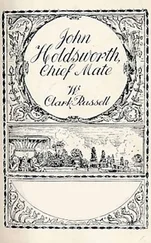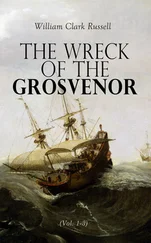The skipper and Holdsworth scrambled to the companion-ladder and gained the deck. In a trice they saw what had happened. The ship, with all sails set, had been taken aback.
Away to windward, in the direction directly contrary to where the wind had been blowing before dinner, the sky was livid, flinging an early night upon the sea, and sending forth a tempest of wind that tore the water into shreds of foam. The whole force of the hurricane was upon the ship’s canvas, which lay backed against the masts, and the vessel lay on her beam-ends, her masts making an angle of forty degrees with the horizon.
The confusion was indescribable. Every halliard had been let go; but the yards were jammed by the sails, and would not descend. The clew-lines were manned, but the sheets would not stir an inch through the blocks. Nor was the worst of the squall, tempest, hurricane, whatever it might be, upon them yet; that livid pall of cloud which the lightning was seaming with zigzag fire was still to come, and with it the full fury its scowling aspect portended.
“My God!” thundered the skipper to the second mate, who stood white, cowed, and apparently helpless, “what have you brought us into?”
The wheel was jammed hard a-starboard, but the ship lay like a log, broadside on to the wind, her masts bowed almost on a level with the water.
“Haul! for your lives, men! haul!” shrieked the skipper frantically to the men, who appeared paralysed by the sudden catastrophe, and stood idly with the clew-lines and reef tackles passed along them.
Holdsworth, half-way up the weather-poop ladder, his head above the bulwarks, saw sooner than the captain what was about to happen.
“Crowd to windward, all hands!” he roared. There was no time to say more; the great broad, livid cloud was upon them even whilst Holdsworth sang out the command; the men held their breath—unless the masts went the vessel was doomed.
Crash! A noise of wood shivered into splinters, of flogging ropes and sails thundering their tatters upon the wind; the fore and main masts went as you would break a clay-pipe stem across your knee—the first, just below the top, the other clean off at the deck; and the huge mass of spars, ropes, and sails lay quivering and rolling alongside—a portion on deck, but the greater bulk of them in the water—grinding into the vessel’s side as if she had grounded upon a shoal of rocks.
The ship righted, and then another crash; away went the mizzen-topmast, leaving the spanker and cross-jack set. The wind caught these sails and swept the ship’s head round right in the eye of the storm, and off she drove to leeward, disabled, helpless—dragging her shattered spars with her, like something living its torn and mangled limbs.
There was no situation in the whole range of the misfortunes which may befall a ship at sea more critical than the one the “Meteor” was now in. The sea was rising quickly and leaping high over the ship’s bows, pouring tons of water in upon the decks (the weight of the wreck alongside preventing the vessel from rising to the waves), and carrying whatever had become unlashed—casks, spare spars, and the like—aft to the cuddy front, against which they were launched with a violence that broke the windows, and soon promised to demolish the woodwork.
But the worst part of the business was—the action of the sea set the spars in the water and the hull of the ship rolling against each other, and the thump, thump, thump of the bristly wreck against the vessel’s side sent a hollow undertone through the hooting of the tempest that was awful to hear.
Though the mizzen-mast still stood, the weight of the other masts in falling had severely wrenched it, and it literally rocked in its bed to the swaying of the great spanker-boom. Add to all this the midnight darkness in the air, which the flashes of lightning only served to deepen by the momentary and ghastly illumination they cast.
Yet, if the ship was not to be dragged to destruction, it was imperative that she should be freed, and freed at once, from the ponderous incumbrance of the wreck that ground against her side. The captain had shouted himself hoarse, and was no longer to be heard. But now Holdsworth made himself audible in tones that rose above the gale like trumpet-blasts.
“We must clear the wreck or founder! All hands out with their knives and cut away everything!”
A comprehensive order that must be literally obeyed.
“Carpenter!” he roared.
“Here, sir,” came a voice from the main-deck.
Holdsworth sprang in the direction of the voice: shouted again, and the man was at his side.
“Quick! Where’s your tool chest? Bear a hand, now!”
The two men fought their way through the water that came drenching and flying over the forecastle, to the boatswain’s berth, which the carpenter shared; and in a few moments returned staggering aft with their arms full of tools, which they thrust into the hands of the men. Holdsworth seized an adze; the carpenter another; and to it fell all hands, feeling for the ropes and then letting drive at them.
The mere occupation heartened the men, who worked with a will, bursting into encouraging cheers from time to time and calling to each other incessantly. The lightning was so far useful that it enabled them to obtain glimpses of the progress they made. The starboard shrouds lay across the deck, from bulwark to bulwark, like bridges; these were the first that were dealt with. They kept the wreck close alongside, and the strain upon them was enormous. Whilst Holdsworth and the carpenter hacked, they repeatedly called to a few of the men whose zeal kept them working on the lee side, though their figures could not be seen, to stand clear, wisely guessing that after a few of the shrouds had been severed, the whole would part like a rope-yarn: and this happened. One final blow divided a shroud and left the weight upon a few others, which were unequal to support it; and as they flew a loud shriek rose; a man had been caught by the flying shrouds round the body and whirled overboard like dust. But in the darkness none could tell who the messmate was that had lost his life.
The parting of these shrouds released the wreck from the ship’s side, and it drifted some fathoms away. The horrible grinding sounds ceased; but still the masts and yards, which the lightning disclosed seething in the water, black, ugly, and as dangerous as a lee-shore, were attached to the hull by a network of rope, all which must be severed. The knives of the men cut and hacked in all directions; and first here and then there, and sometimes as if crashing in half-a-dozen places at once, the adze wielded by Holdsworth was to be heard.
The last shroud was at length severed, the last rope parted; the hull, drifting faster than the dead weight of wreck, fell astern of the horrible incumbrance, and the next flash of lightning showed the water boiling round the black spars ahead.
“Hurrah!” shouted Holdsworth; but the men, wearied and faint after their long and great struggle, and sickened by the shriek of their perishing comrade, whose cry still sounded in their ears, answered the encouraging shout faint-heartedly.
The ocean was still a black and howling wilderness, and the vessel plunged and rolled, and trembled in the jumping seas, with her head right in the wind’s eye, and the water pouring over her in sheets of undulating fire. The water had stove in the cuddy front, and was washing in tons down into the steerage. What they had now to do was to furl the cross-jack; aft came the men and clewed the sail up; on which the vessel fell broadside to the wind and rolled her bulwarks under water.
To furl the cross-jack was a job full of peril; but, if the thing was to be done at all, it was to be done by a coup de main. Holdsworth, crying to the hands to follow him, sprang up the port mizzen rigging. Half-a-dozen went up after him, the rest skulked in the darkness, and stood holding their breath, expecting every moment the crash that should fling the men aloft into the sea. No glimpse of the brave fellows was to be obtained; nothing but the flapping outline of the white sail could be seen; the mast creaked harshly; but from time to time the men’s voices could be heard even above the roar of the tempest, the groaning of the ship, and the rolling of spare casks, a sheep-pen which had become unlashed, and other things about the waist and quarter-deck; and slowly the faint spaces of thundering canvas vanished in the darkness, and were securely stowed.
Читать дальше












